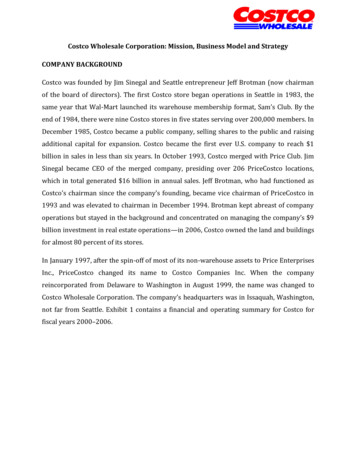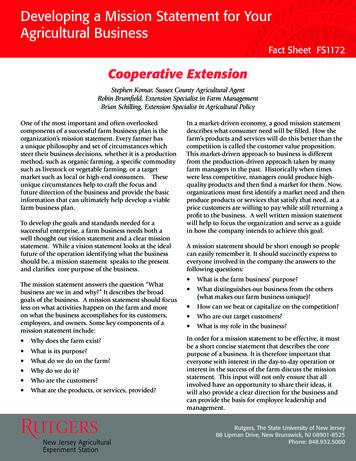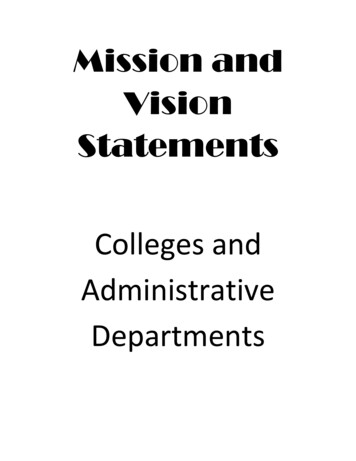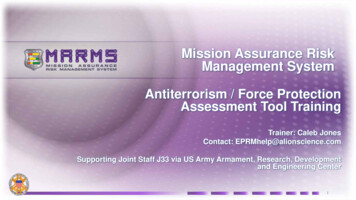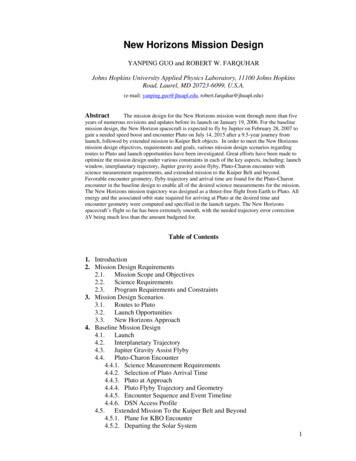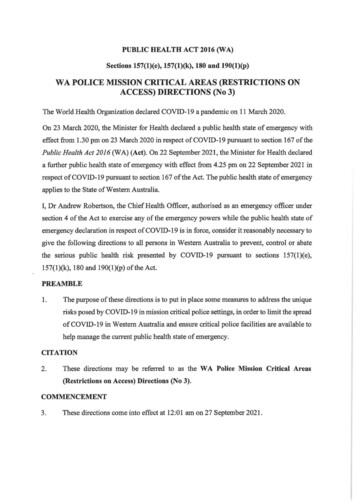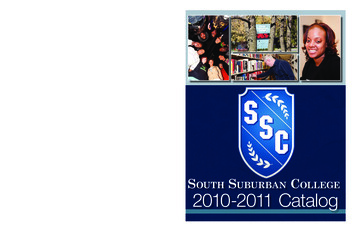
Transcription
Our Mission Is to Serve our Students and theCommunity Through Lifelong Learning. Blue Island Lynwood Burnham Markham Calumet City Midlothian Country Club Hills Oak Forest Dixmoor Phoenix Dolton Posen East Hazel Crest Riverdale Harvey South Holland Hazel Crest Thornton Homewood Tinley Park LansingSouth Suburban College15800 South State StreetSouth Holland, IL 60473(708) 596-2000University & College Center16333 S. Kilbourn AvenueOak Forest IL 60452(708) 225-6000www.ssc.eduSouth Suburban College Catalog 2010-2011South Suburban College serves the residents of District510 which includes all or portions of these communities:South Suburban College2010-2011 Catalog
Directory of College AreasMain Campus:15800 South State Street, South Holland, IL 60473708-596-2000In Indiana 219-931-0096 or 219-931-0098708-596-2000 Ext. 2573 (telecommunication device for the deaf)Academic AreasAcademic Services, Vice PresidentRoom 2120, Ext. 2225Allied Health, Life Science & Physical EducationAssociate Dean’s OfficeRoom 4453, Ext. 2258Art and DesignRoom 1101, Ext. 2316University & College Center:16333 S. Kilbourn Ave.Oak Forest, IL 60452708-225-6000Business and Accounting OfficeRoom 2230, Ext. 2383, 2216, 2220Business & Career Institute, Dean’s OfficeBusiness & Industry Training, Ext. 2455Economic & Workforce Development, Ext. 2532Procurement Assistance Center, Ext. 2522Workplace Literacy, Ext. 256458 W. 162nd St., South Holland, IL 60473Business ProgramsRoom 3440, Ext. 2664Campus PoliceRoom 1215, Ext. 2235Communications and HumanitiesRoom 3115, Ext. 2267Continuing EducationRoom 2465, Ext. 2231Computer Information SciencesRoom 3440, Ext. 2664Extension Services, Dean’s OfficeUniversity & College Center16333 S. Kilbourn AvenueOak Forest, IL 60452708-225-6006Engineering and TechnologyRoom 2368, Ext. 2293EnglishRoom 3116, Ext. 2267Human ServicesRoom 3483, Ext. 2275Legal Studies, Dean’s OfficeRoom 3447, Ext. 5807LibraryRoom 1249, Ext. 5603Life SciencesRoom 4469, Ext. 2364Mathematics, Computer Science, &Physical ScienceRoom 4148, Ext. 2254Microcomputer LabsRoom 3258, Ext. 2415 (Open Lab)Room 3241, Ext. 2474 (Open Lab)Financial Aid and Veterans ServicesRoom 2355, Ext. 2321, 2322, 2319Administrative ServicesRoom 2221, Ext. 5757, 2480Affirmative ActionRoom 2448, Ext. 5709Communication ServicesRoom L248, Ext. 5767Foundation OfficeRoom 1245, Ext. 2463Compensation and BenefitsRoom 2123, Ext. 2223Human ResourcesRoom 2124, Ext. 2402, 2236Public RelationsRoom 2134, Ext. 2697Student DevelopmentStudent Development, Vice PresidentRoom 2152, Ext. 2303Job Training DepartmentRoom 4461, Ext. 2530Academic Assistance CenterRoom 2264, Ext. 2649, 2600Physical PlantRoom 1251, Ext. 5727Assessment CenterRoom 2266, Ext. 2495PublicationsRoom 2448, Ext. 2203, 2228, 2697AthleticsGymnasium, Ext. 2334TreasurerRoom 2221, Ext. 2214Career Development and Jobs CenterCounseling Center, Room 2250, Ext. 2391Enrollment & Community EducationChargebacks, Cooperative AgreementsRoom 2350, Ext. 2262AdmissionsRoom 2230, Ext. 2329College RecruitmentRoom 2150, Ext. 2023, 2314, 2265NursingRoom 4120, Ext. 2260Community Education, Vice PresidentRoom 4455, Ext. 2227Office Administration and TechnologyRoom 3440, Ext. 2664ESLRoom L233, Ext. 2410Physical Fitness And Athletic CenterFieldhouse, Ext. 2515GED HonorsRoom 3129, Ext. 2411ReadingRoom 2329, Ext. 2499GEDRoom 4455, Ext. 2385Social and Behavioral ScienceRoom 3493, Ext. 2272RecordsRoom 2230, Ext. 2326Telecourse LabRoom 1405, Ext. 2464RegistrarRoom 2230, Ext. 5814AdministrationRegistrationRoom 2230, Ext. 2330BookstoreRoom 1248, Ext. 2281, 2282President’s OfficeRoom 2134, Ext. 2200Information TechnologyRoom 4160, Ext. 2243MusicRoom 1102, Ext. 2316Administration, Vice PresidentRoom 1233, Ext. 2212, 5721President’s OfficeStudent Help CenterRoom 2348, Ext. 5718Child Development CenterL233, Ext. 2210Counseling CenterRoom 2350, Ext. 2306, 5732Educational Talent SearchRoom 1155, Ext. 2635, 2694IntramuralsRoom 2329, Ext. 2337Services for Students with DisabilitiesRoom 2268, Ext. 2572Student Life & LeadershipRoom 2329, Ext. 2499, 2418Student Government AssociationRoom 1105, Ext. 2338, 2337Transfer CenterRoom 2250, Ext. 2310, 2311Board Of TrusteesFrank M. ZuccarelliJohn A. DalyChairmanVice-ChairZuccarelli, a South Holland resident, has served as a memberof the South Suburban College Board of Trustees since 1978and has been Board Chairman since 1987. A former studentof the college, Zuccarelli is committed to maintaining anaffordable educational system for the working person whilekeeping local taxes at the lowest possible level.Daly, an Oak Forest resident, has served as a member of the SSCBoard of Trustees since 1991. He became Vice-Chairman in 1994and served as Chairman of the Presidential Search Committees.As Vice-Chair of the Board, Daly leads SSC's ongoing efforts toimprove services while maintaining a stable or reduced tax rate.During Frank’s tenure, SSC has expanded its academicprograms, initiated tuition deferments, and developedpartnerships with DePaul, Governors State, Chicago StateUniversity and the University of St. Francis among otherinstitutions.In addition to his role at SSC, Zuccarelli has served asThornton Township Supervisor since 1993.Married with five children, Daly is the Village Administrator forOrland Hills. In addition to his role at SSC, Daly continues toserve as Chairman of the South Suburban Mayors and ManagersAssociation's Management & Finance Committee since 1996. Heis the past Chairman of the Chicago Southland Convention andVisitor’s Bureau and a member of the Southwest Conference ofMayors. Daly also has been a member of the Selective ServiceLocal Review Board since 1991.“Explore this schedule to learn more about the programsand services available at SSC. We welcome you to learnmore about resources we provide to South Suburbanresidents and hope you will see new opportunities for youand your family.”Katie Jackson BookerJacqueline MartinJackson Booker, a Dixmoor resident, has served as amember of the SSC Board of Trustees since 1994. She hasa strong interest in assuring that the college’s programs andservices are accessible to all District 510 residents who maybenefit from them. Jackson Booker serves as Chairpersonof the Board’s Policy Committee, and is active with the SSCDisabled Students Advisory Board.Martin is in her second term as a member of the SSC Board ofTrustees, and serves as Chairperson for the Board’s ArchitecturalCommittee. Employed as a legislative assistant, Jacque alsoserves on the Advisory Board for Disabled Students and as aDirector on the SSC Foundation Board. Martin is an active memberof the Lansing Junior Women's Club, where she is the formerpresident and current vice-president of the organization. She wasvoted Junior of the Year for 1997-98 and 2000-01. Jacque is alsoa member of the Parent Teacher Association for School District215, a Room Parent of School District 158, and coach for theLansing Lions Widget Cheerleading Squad.A married mother of four children, four grandchildren andKameron, Jackson Booker is Public Relations Specialist forACHN South Suburban Cook County. Jackson Booker is alsoa member of St. Mark Church Cathedral, Vice President of St.Mark’s Medical Facility in Harvey, President of the DixmoorCivic Organization, member of the West-Harvey DixmoorBoard of Education #147 where she serves as Chairpersonof the Finance Committee, and Secretary-Treasurer of theNational CBSBM.Anthony DeFilippoDeFilippo, a Calumet City resident, has served on theSSC Board of Trustees since 1989. His involvement in thecommunity is rather extensive, as he belongs to a numberof civic, social, church and professional organizations.DeFilippo’s Masters degree in finance allows him to focuson maintaining the financial integrity of the college.As a registered pharmacist, DeFilippo works to bringhealthcare services to underserved residents in the MetroChicagoland area. He works in the public healthcare sector,serves as a local health commissioner, and is an adjunctfaculty member to a number of local universities. DeFilippo isalso an advocate of the college's health science programs.Terry R. WellsWells, a Phoenix resident, was appointed to the SSC Board ofTrustees in 2001. He currently serves as Chairperson of the Board’sLegislative Committee, and represents SSC as a legislative liaisonin Springfield through the Illinois Community College TrusteeAssociation. Terry’s goals include working with local high schoolsto inform them about the wealth of programs and support servicesavailable at SSC, and increasing student enrollment.Married with two children, Wells is employed as a history teacherat Thornton High School. He also serves as President of the Villageof Phoenix, a position he has held since 1993. In addition to hisother roles, Trustee Wells also serves as President of the SouthSuburban Mayors and Managers Association.Joseph Whittington, Jr.Whittington, a Harvey resident, was elected to his first term asa member of the SSC Board of Trustees in 2005. He currentlyserves as Chairperson of the Board’s Audit Committee. Josephhas been a mentor to countless youth in the community for thepast 24 years.Married with four children, Whittington is employed by P.A.C.E.Institute, located within the Cook County Department of Correctionsin Chicago. Over the past 30 years, he has worked his way up to theesteemed position of Senior Facilitator. Whittington has also servedas the 2nd Ward Alderman of Harvey since 2003, where he hasinitiated programs to revitalize the 2nd Ward.
2010-2011 College Catalog Table of ContentsTable of ContentsMission Statement. 2Student Codes of Conduct. 3Violence & Threats of Violence Policy/Accreditations. 4-8Enrollment, Academic and Tuition Information. 9-21College Transfer Programs.22-30Recommended Curricula for Transfer Programs. 31-45Specific University Transfer Information. 46-77Career Curricula. 78-120Transfer Opportunities. 121C.A.R.E.E.R.122Course Descriptions. 123-164Financial Aid and Veterans Information. 165-167Services for Students. 168-171Affirmative Action. 171General Information.172-173College Calendar 2010-2011.174-175Administration/Faculty. 176-180Index.181-188Degree/Program Completion Plan.189Board of Trustees.Inside Back CoverEqual Educational OpportunitySouth Suburban College must ensure equal educational opportunities are offered tostudents regardless of race, color, national origin, age, sex, religion or persons withdisabilities. Consistent with this commitment, the College assures that no person shallbe excluded from or denied the benefits of any program on the basis of sex, age, color,race, creed, religion, national, regional origin or disability. Further, in facilitating thiscommitment the College values educational opportunities for students to interact withpositive staff role models from diverse racial, ethnic, and gender groups. In addition,no otherwise academically qualified person with disabilities shall be excluded fromor denied the benefits of any program or activity provided he/she has the “ability tobenefit” as defined by Federal Statutes and Regulations. South Suburban Collegethrough its policies and programs has implemented programs which enhance andencourage educational opportunity for students.Questions in reference to affirmative action may be directed to:Affirmative Action Officer, South Suburban College15800 S. State Street, South Holland, IL 60473(708) 596-20001
2Mission Statement 2010-2011 College CatalogMission StatementThe mission of South Suburban College is to Serve our Students and the Communitythrough lifelong learning.SSC is dedicated to: High quality education, training, and services for all individuals who have theability to benefit from our programs. Programs that are accessible and affordable provided to a diverse communityof learners. Training delivered in collaboration with local businesses. A community of staff, faculty, and students that create an environment andresources for learning. Up-to-date facilities and technology that help prepare students for transfer tobaccalaureate programs or the job market.History of the CollegeSouth Suburban College was founded in 1927 as Thornton Junior College. At thattime, the College was an extension of Thornton Township High School in Harvey,Illinois. The Illinois Community College Act of 1965 created Community CollegeDistrict 510 and enlarged the area served to include high school districts 205, 215and 228 (Thornton, Thornton Fractional, and Bremen).In 1969 the name was changed to Thornton Community College to emphasize thecomprehensive mission of the College. The College moved into its existing maincampus facilities in 1972. In June of 1988, the Board of Trustees voted to changethe name of the institution to South Suburban College to more accurately reflect thegeographic location of the College.In an effort to serve the western portion of the district and to provide opportunitiesfor district residents to complete a four-year degree, the University & College Centerwas opened in Oak Forest in 1992.Goals Provide credit courses and Associate degree programs for academicallyprepared students to assist them in preparing for transfer to a four-year collegeor university. The College will be accountable for the quality of academicprograms and the assessment of learning. Provide high quality, accessible, and affordable credit courses and associatedegree and certificate programs for academically prepared students to assistthem in preparing for occupations that require career education beyond thehigh school level. Provide developmental instruction in reading, writing and mathematics skillsto students requiring these skills in order to succeed in other college programsor to complete a high school Equivalency or GED program, and to expand adulteducation. Increase the number and diversity of students who complete training andeducational programs by providing academic advising, learning resources andsupportive services, such as specialized learning assistance, for students witha wide range of academic needs. Partner with local businesses and industry to sustain strong economic growthand to maintain a competitive workforce. The College will provide universaltechnical skills training to qualify community residents for employment, and willassist businesses in workforce development. Complement classroom instruction with student opportunities throughworkplace internships, cooperative education and other work-based learningapproaches. Offer activities, services, and programs that enhance student life and enrich theeducational experience of the student to increase knowledge of societal andcivic responsibilities in a complex society. Design and implement programs thatdevelop student leadership, ethical decision making, and international culturalunderstanding. Collaborate with area elementary and secondary school districts to develop andprovide educational services to their students and staff. Provide high quality educational programs by utilizing quality measures suchas input from advisory committees, assessment of student learning outcomes,and recommendations from our accrediting agencies. Maintain fiscal responsibility by continually improving productivity, costeffectiveness, and accountability.
2010-2011 College Catalog Mission StatementStudent Codes Of ConductIt is the responsibility of every student to become familiar with the College’s StudentCode of Conduct.Academic ConductThe Academic Code of Conduct is intended to maintain an atmosphere conduciveto developing optimum classroom educational experiences for all members of theCollege community, faculty and students. A violation of the Academic Code of Conductincludes, but is not limited to, any act of cheating, plagiarism or electronic data fraudrelated to the instructional processes of South Suburban College. Cheating is breakingthe rules or creating an unfair advantage over someone else. Cheating includes, butis not limited to, taking credit for someone else’s answers or unauthorized use ofany materials, resources or electronic devices while completing an exam, quiz orassignment at South Suburban College. Cheating also includes submitting someoneelse’s work as one’s own or helping another student cheat.PlagiarismPlagiarism includes, but is not limited to, direct quotation or paraphrasing of the workof someone else without proper citation of the original source.For help avoiding plagiarism seek assistance from an instructor, the AcademicAssistance Center or the Writing Center before submitting an assignment.1. When an incident of plagiarism, as described in the syllabus, is identified,the faculty member shall meet with the student to discuss the situation andcomplete an incident report. If a face to face meeting is not possible, telephoneor electronic discussion is acceptable, but must be documented. If the matteris found to be a misunderstanding, the process stops; the faculty member givesthe student a copy of the report and keeps a copy for his or her records. If thestudent accepts responsibility for plagiarizing, the grading policy as stated inthe course syllabus will be applied. The student is given a copy of the report,and the faculty member retains a copy with any supporting documentation andforwards a copy of the report and materials to the Vice President for AcademicServices office for validation by the Academic Conduct committee.2. If the matter is not resolved at Step 1, the faculty member will submit theincident report promptly to the administrator to whom the faculty memberreports (e.g., the Dean, Associate Dean or Director for the instructional area).The Academic Administrator will forward a copy of the report to the VP forAcademic Services. When an instructor is requesting a course grade of “F”,the Administrator will forward a copy of the report to the Director of EnrollmentServices so that a Registrar’s Hold can be placed on the student’s recordfor the course involved. This hold will remain until the incident is resolved.The student shall utilize the Academic Conduct Appeal Form to initialize a formalappeal and submit the information to the appropriate academic administrator.This written appeal must be filed with the appropriate academic administratorwithin five business days of the date of discussion with the instructor. Theacademic administrator may discuss the concern with the student andinstructor. The academic administrator will compile all information and forwardthe complete appeal packet to the appropriate Vice President for step 3 of theprocess. The student will continue to attend class throughout the process.3. Upon receipt of the completed packet from the academic administrator, theVice President will schedule a meeting with the Academic Conduct Committee,student, and instructor to review the incident and the grade issued. In the eventthat a student has already withdrawn from the course in which the incidentoccurred, a final grade of “F” may still be issued if so outlined in the coursesyllabus. The Vice President will communicate the decision of the AcademicConduct Committee in writing to the student. The decision of this committee isfinal and will be reflected in the student’s grade. Every attempt will be made tohave the process concluded within a reasonable time frame. The hold placed onthe student’s record will be removed once the committee reaches a decision.34. Multiple Incidents :For a second validated offense of plagiarism, a studentwill receive a one-semester suspension. Following three or more validatedoffenses of plagiarism, the student will be expelled from the college for noless than two academic years. A student has the right to appeal any academicsanctions through the office of the Vice President of Academic Services andthe Academic Conduct Committee. Academic sanctions for cheating andplagiarism may include failure of an assignment, failure of a quiz/exam, failureof a course or exclusion from a program of study. The sanctions are determinedby the individual instructor and are clearly stated in each course syllabus. If aparticular course policy is unclear, consult the individual instructor. Academicsuccess is described not only by the grade received but also by how the gradeis earned. Students may appeal academic sanctions through the appropriateappeal process.Dress Code of ConductDress codes are flexible, but students may be requested to leave the campus if amode or style of dress interferes with academic processes.Student Behavior Code of ConductThe Student Code of Conduct has been developed to maintain an atmosphereconducive to developing optimum educational experiences for all members of theCollege community. Conduct in violation of this Code includes, but is not necessarilylimited to, the following:a. Any acts of classroom disruption that go beyond the normal rights of studentsto question and discuss with instructors the instructional process relative tosubject content.If a student is unresponsive to a faculty member’s intervention and remainsdisruptive in the classroom, the faculty member may ask the student to leavethe class session. The student may not return to class until a meeting isheld between the student and the instructor or the Dean Of StudentDevelopment. The instructor shall determine whether to meet with thestudent. Appropriate classroom behavior will be reinforced.Continued or excessive acts of classroom disruption will prohibit the studentfrom returning to class until meeting with the Dean Of Student Developmentand establishing a behavior contract. The behavior contract must beagreeable to the faculty member, Dean Of Student Development and thestudent. Violation of a behavior contract will result in additional sanctions.The Dean Of Student Development may also impose other sanctions.b. Using pagers, cell phones, and other electronic communication andentertainment devices (e.g. cd players, tape players, etc.) in classes, labs, andthe library. Pagers and cell phones should be turned off or set on vibratingalarm. Electronic entertainment devices should be turned off and put away priorto entering classes, labs, or the library;c. Using or occupying any space or facilities owned or leased by the College at anytime without authorization of the Board of Trustees or the appropriate Collegeadministrators;d. Attempting to prevent or obstruct faculty and/or students going to and fromclasses or College sponsored activities;e. Preventing or attempting to prevent any individual on the College campus fromcarrying out assigned duties or lawful business;f. Willfully destroying or damaging College property;g. Blocking pedestrians or vehicular traffic on or near College facilities;h. Participating in any activity that endangers the physical being of any person;i. Violating any municipal, county, state or federal law, statute or ordinance whileon College facilities;j. Refusing to comply with College officials performing of their duties;k. Any act of dishonesty toward the College, including, but not limited to, cheating,plagiarism, misuse of College documents or records, forgery, or knowinglyfurnishing false information to the College, or to others in the name of theCollege;l. Any conduct considered disorderly, lewd, indecent, or obscene, includingprofane or abusive language toward members of the College community;
4Mission Statement 2010-2011 College Catalogm. Possessing, selling, using, consuming, or distributing alcoholic beverages orcontrolled substances or being under the influence of such items at any College facilityor at an officially sponsored College event on or off campus except an off campusactivity where all in attendance meet the minimum age requirement established bylaw, and the location of the activity does not prohibit such beverages;n. Possessing or using of firearms, explosives, harmful or dangerous chemicalsor other weapons capable of inflicting injury to persons or damage to property,except as permitted by College regulations;o. Gambling while on College facilities, unless the activity has been approved bythe College and is permitted by law;p. Any acts of unprofessional conduct.Non-violent violations of the Student Code of Conduct will result in remediation.Remediation will teach the student responsible behavior, the need to accept theconsequences of behavior, and effective communication and conflict resolution skills.Violation of this Code of Conduct is considered grounds for sanction against thestudent and, if the situation should warrant, binding over to civil authorities forappropriate action.Due Process For The Student Code OfConductA student accused of violating the Code of Conduct will be referred to the Dean ofStudent Development or the College Disciplinary Standards Committee. Any allegedinfraction requiring the intervention of the College Police Department, which mayinclude, but is not limited to, acts of violence or threats of violence, drug or narcoticviolations, or any other action considered a Severe Sanction, will be referred to theDean of Student Development to schedule a hearing on the infraction with the CollegeDisciplinary Standards Committee. The role of the Dean of Student Developmentor the College Disciplinary Standards Committee, as appropriate, is to determinewhether the student is guilty of the violation. The student will receive notice of thealleged violation, including the specific code violations and appropriate reference tothe Student Code of Conduct.The Dean or the College Disciplinary Standards Committee may impose any ofthe following sanctions upon any student found to have violated the StudentCode Of Conduct. Classifications of sanctions from minor to intermediate orsevere will be imposed based upon the severity of the offense. More than oneof the sanctions may be imposed for a single violation.1. Minor Sanctionsa. WARNING: Student receives a warning and/or reprimand that the College hastaken note of the student’s action and further violations of the Student Codeof Conduct may result in probation, suspension or dismissal depending uponseverity of the incident.b. PROBATION: Student is reprimanded for violating specified regulations.Probation is for a designated period of time and may result in more severedisciplinary sanctions if further violations occur during the probationary period.The student will receive written notification of his/her probation.c. BEHAVIORAL CONTRACT: Student enters into a written agreement to modifybehavior. The student’s failure to fulfill terms of the contract may result inadditional disciplinary sanctions.2. Intermediate Sanctionsa. RESTITUTION: Student is required to reimburse for damage to or misappropriationof property in addition to other types of disciplinary action.b. DISCRETIONARY SANCTIONS: Student is required to complete workassignments, community service, or other assignments.c. ALCOHOL/DRUG SANCTIONS: Student may receive an assessment and berequired to participate in counseling or educational programs in lieu of, or inaddition to, the imposition of other disciplinary actions. Parents of studentsunder the age 21 will be notified in the event of discipline related to alcoholand drug use.d. WITHDRAWAL: Student will administratively be withdrawn from any and allclasses with consequent loss of associated tuition and fees.3. Severe Sanctionsa. SUSPENSION: Student is prohibited from attending all enrolled College coursesfor a determined period of time and must meet all specific requirementsfor readmission to College courses as determined by the Dean of StudentDevelopment or the College Disciplinary Standards Committee. A suspensionwill not exceed ten [10] school days per offense.b. DISMISSAL: Student is prohibited from attending all enrolled College coursesfor more than ten (10) days. A Dismissal shall not exceed the remainder of thecurrent semester through the following full semester (Fall or Spring). Followingthe dismissal period, the student must appeal in writing to the Dean of StudentDevelopment for reinstatement.c. EXPULSION: Student is prohibited from attending all enrolled College coursesfor a period not to exceed the remainder of the current semester through thefollowing two (2) full semesters (Fall or Spring). Following the expulsion period,the student must appeal in writing to the Dean of Student Development. TheDean will review the appeal with the Vice President for Student Developmentand determine whether the appeal should be referred to the College DisciplinaryStandards Committee. All decisions made by the College Disciplinary StandardsCommittee are final.Severe sanctions are mandatory for the following offenses: Physical harm, or threat of physical or mental harm, to College employees and/or students and any other members of South Suburban College or its visitors; Any conduct, or threat of conduct, considered lewd, indecent or obscene; Sale or distribution of any narcotic, drug, marijuana, depressant or otheraddictive or hallucinogenic substance not expressly permitted by law on Collegeproperty, either owned, contracted, rented or leased; Possession or u
Business and Accounting Office Room 2230, Ext. 2383, 2216, 2220 Business & Career Institute, Dean's Office Business & Industry Training, Ext. 2455 Economic & Workforce Development, Ext. 2532 Procurement Assistance Center, Ext. 2522 Workplace Literacy, Ext. 2564 58 W. 162nd St., South Holland, IL 60473 Campus Police Room 1215, Ext. 2235 .


